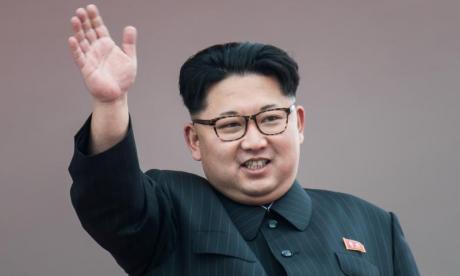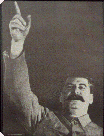Posted on May 5,
2018
One Nation, Under Kim
Conquest remains the Norks’ endgame
by
Daniel
Clark
If you have a single skeptical bone in your body, you
must be incredulous at how the West is being taken in by North Korea’s “charm
offensive.” Is there really such thing
as North Korean charm? That sounds like
the world’s worst breakfast cereal, consisting of a substance somewhat less
edible than hardened marshmallows, stamped into little yellow hammers and
sickles.
Up until now, the “Democratic People’s Republic of
Korea” and its Supreme Leader, Kim Jong-un, have been about as charming as a
briskly shaken bagful of starving weasels.
Yet Kim emits a series of unverifiable promises through that blowfish
grin of his, and everyone is eager to take him at his word. Why, of course the Norks will dismantle their
nuclear program, stop threatening their neighbors to the South, and become a
peaceful global citizen. Kim said they
would. What other assurance could we
possibly need?
 Those
who are approaching a presumptive Kim-Donald Trump summit meeting with that
kind of optimism are forgetting the First Law of Geopolitics, which is that a
smiling Communist dictator is never a good thing. If Kim really felt compelled to give up his
nation’s nukes and expansionist ambitions because of Trump’s hackneyed “fire
and fury” rhetoric, he’d probably look like he was trying to figure out what
his dirt was doing in Boss Kane’s ditch.
Instead, the grinning goon behaves as if he were the boss, as his words and actions establish the story line
on a daily basis.
Those
who are approaching a presumptive Kim-Donald Trump summit meeting with that
kind of optimism are forgetting the First Law of Geopolitics, which is that a
smiling Communist dictator is never a good thing. If Kim really felt compelled to give up his
nation’s nukes and expansionist ambitions because of Trump’s hackneyed “fire
and fury” rhetoric, he’d probably look like he was trying to figure out what
his dirt was doing in Boss Kane’s ditch.
Instead, the grinning goon behaves as if he were the boss, as his words and actions establish the story line
on a daily basis.
For all of the Norks’ neighborly overtures, they have
never wavered from their goal of reunification, which is just a
pleasant-sounding term for taking over South Korea and cannibalizing its
wealth, in order to prop up the Communist regime for the foreseeable
future. Whether they invade by force, or
begin their infiltration by way of the negotiating table, it all works out the
same.
They’ll probably start by proposing some nebulous
half-measure, by which North and South unite under one name and one flag, but
still exist as semi-autonomous regions.
There’s no doubt which side would be designed to prevail in the long
run, the totalitarians being the militarily superior of the two. Peaceful coexistence will only last as long
as it takes for the West to let its guard down.
Kim has no interest in being the lion that lies down with the lamb. He aims to be the lion that lies down for a
nap after devouring a nice gyro platter.
The great obstacle in his way is the American military
presence that has remained since the cease fire that unofficially ended the
Korean War in 1953. Our forces in the
DMZ are often referred to as a “speed bump,” being physically unable to stop an
invasion from the North. The deterrent they've
provided has proven invaluable, however, because the Norks will never
provoke a full-scale war with the United States by overrunning them.
 But
what if Kim’s “charm” campaign succeeds to the point that it becomes the
conventional wisdom that our presence there is no longer necessary, or even
that it has become detrimental to Korea’s national healing? Will Trump – or his successor, depending on
how long this scenario takes to unfold – be willing to resist the popular
momentum toward that conclusion?
But
what if Kim’s “charm” campaign succeeds to the point that it becomes the
conventional wisdom that our presence there is no longer necessary, or even
that it has become detrimental to Korea’s national healing? Will Trump – or his successor, depending on
how long this scenario takes to unfold – be willing to resist the popular
momentum toward that conclusion?
Without any Americans in harm’s way, there would be
little reason for the Norks not to attack the South militarily. Once their offensive was underway, they could
fire a few missiles across the Sea of Japan, and announce to the world that
rumors of their denuclearization have been greatly exaggerated. Who would intervene then?
In 1950, the Communists tried to take South Korea by
force. They were defeated, at no small
cost to the United States, its Western allies, and the South Korean
people. To let them take it now, with
some unverifiable promises and a dopey grin, would be a betrayal of the
principles of freedom the likes of which has not been seen since Yalta.
That’s where FDR and Churchill indirectly consigned
Eastern Europe to Soviet domination, in exchange for which Stalin was to
declare war on Japan to hasten the end of the Second World War. Stalin did not fulfill that promise until
those several days between the bombings of Hiroshima and Nagasaki, when the
war’s conclusion was imminent anyway.
The Soviet Union took that opportunity to snatch several territories
from Imperial Japan, including the northern half of Korea. Still, what else were the Leaders of the Free
World supposed to do, spoil everybody’s good mood?
The Shinbone: The
Frontier of the Free Press